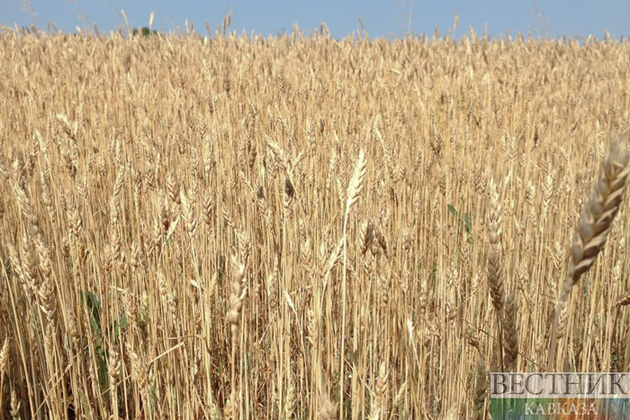Egypt, Tunisia and Algeria all import large amounts of grain from Russia and Ukraine. The standoff along Ukraine's border has implications for the whole world, with the potential for major disruption to essential commodity supplies, from gas to wheat, looming large, Middle East Eye writes.
In North Africa, the crisis threatens grain supplies to regional states, especially with almost all these states being heavily dependent on grain imports from outside their borders. North Africa contains by far the world's largest wheat importers. Countries like Egypt, Algeria, Tunisia and Libya produce less than half the amount of grains - especially wheat - that their populations consume every year. These countries' grain imports come from a wide range of suppliers. At the top of the list: Ukraine and the Russian Federation.
Major exporters
Ukraine, the world's fifth largest wheat producer in 2019, exports most of its output to North African states. Countries like Egypt and Tunisia were among the fastest growing foreign markets for Ukrainian wheat that year, with Egypt accounting for a higher proportion of Ukraine’s wheat exports than anywhere else in the world. Between July last year and the end of January this year, Russia exported millions of tonnes of wheat to North African states as well. Possible fears from the effects of the crisis on grain supplies to North Africa coincide with the expectation that Russian wheat output will fall in 2021-22, due to adverse weather conditions, particularly dry and warm summers. Meanwhile, severe drought levels in most of North Africa, including in Tunisia, Algeria and Morocco, are also expected to raise grain imports. This comes as the economies of regional states continue to reel from the effects of the Covid-19 pandemic.
A hundred million mouths to feed
By far the world's largest importer of wheat, Egypt expects to be severely affected by possible disruptions to wheat supplies from Russia and Ukraine. The vast Arab country - population 102 million and rising - imported 12.5m tonnes of wheat in 2020-21. Egypt is working hard to increase its own wheat output, but its current dependence on imports would make any Ukrainian conflict very bad news, specialists said. Once one of the world's great breadbaskets, Egypt has lost most of its farmland over the decades to urban sprawl, as its population grows and grows. National wheat output amounted to 9m tonnes last year. But this output covers less than 50 percent of local consumption.
Most of the wheat is used in the production of bread for Egyptians. Most of that is then distributed within the nation’s food rationing system, in which the vast majority of the country is enrolled. Bread is an indispensable part of Egyptians' diet and threats to supplies from specific suppliers may tempt the Egyptian government to search for alternatives. Almost 85 percent of Egypt's wheat imports in 2020-21 came from Russia and Ukraine. "I think the government should start exploring the possibility of getting national wheat needs from other suppliers," Hesham Abuldahab, a member of the grains section at the Cairo chamber of commerce, said.
Tunisia's crisis
In Tunisia, as well, economic problems are likely to be compounded by growing tensions. This country of around 11 million people has been mired in political problems since July last year, when its president, Kais Saied, sacked the cabinet, dissolved parliament and suspended the constitution. Tunisia relies heavily on grain imports from other countries. Cereal imports in the country in the 2021-22 marketing year are forecast at an average level of 3.7m tonnes, similar to the previous year. Wheat makes up almost half of Tunisia's overall cereal imports. These come from a wide range of suppliers, on top of which are Ukraine and Russia.
The crisis, Tunisian specialists said, would negatively affect grain supplies to their country. "Russia is Tunisia's traditional ally when it comes to wheat imports," Tunisian political commentator Najeh Missaoui told MEE. "The Tunisian government has already started searching for alternatives." The North African nation, which grew grains on 810,000 hectares of its farmland in 2021, produced 1.6m tonnes of grains in that year, less than half its national needs. This comes as the Arab country's farmers stay away from growing wheat on their farmland due to a series of factors, including the low prices set by the government for the purchase of the cereal. Climate change is also having an impact on Tunisia’s ability to produce enough food for its people, with factors such as insufficient rainfall and droughts playing a part.
Bad timing in Algeria
The potential supply crisis also comes at a bad time for Algeria, another North African state heavily dependent on grain imports from other countries. Insufficient rains last year caused a staggering drop of 40 percent in Algeria's grain output, including wheat, meaning Algerian authorities had to make up for the shortages by increasing imports. In the same year, Algeria produced 3.9m tonnes of grains, while importing 7m tonnes.
Having previously relied on European wheat, Algeria imported it from Russia last year for the first time in five years, due to changes in its import specifications. Wheat imports in Algeria are expected to rise to 8m tonnes this year, even as the country struggles to reduce dependence on imports, including by reclaiming land in the desert.
In late January, Algerian President Abdelmadjid Tebboune called for increasing agricultural production, especially the production of grains, considering this an issue of “national dignity”. This was about time, Algerian specialists said, as measures to increase dependence on local production and reduce dependence on imports are sorely needed. "Wheat is a strategic commodity and this is why the government is specifying millions of dollars for imports,” Radwan Abu Heidal, a professor of political science at Algiers University, told MEE. "The government must have prepared scenarios for dealing with a disruption of supplies."






